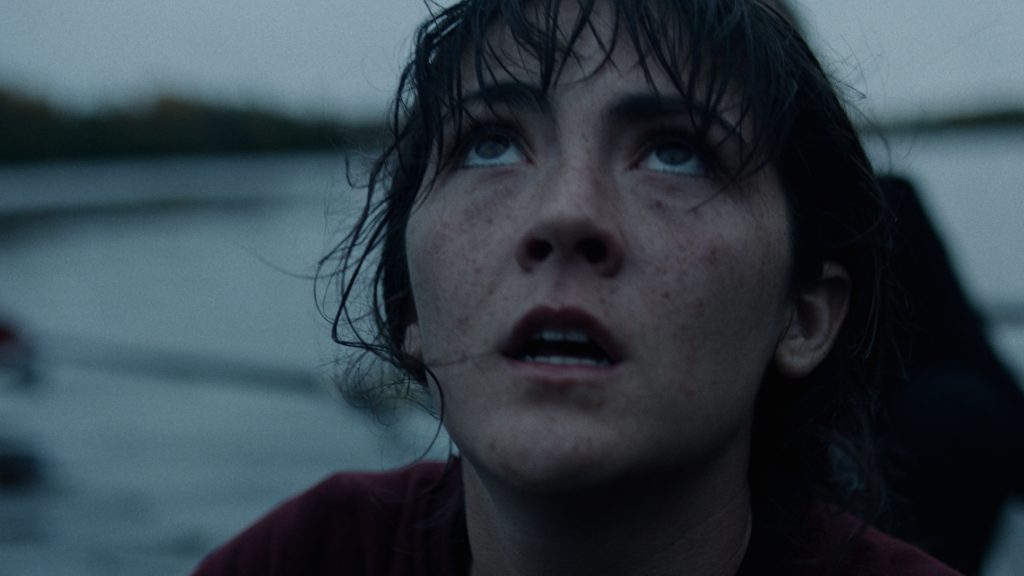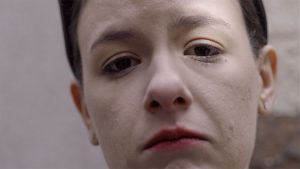August 19, 2022
by Carla Hay

Directed by William Brent Bell
Culture Representation: Taking place in Darien, Connecticut, and briefly in Estonia and Moscow, the horror movie “Orphan: First Kill” features a predominantly white cast of characters (with a few African Americans and one Asian) representing the working-class, middle-class and wealthy.
Culture Clash: A female serial killer in her 30s, who has a medical condition that makes her look like a child, escapes from a psychiatric facility in Estonia, steals a missing child’s identity, and pretends to be the long-lost daughter of a wealthy family in the United Sates.
Culture Audience: “Orphan: First Kill” will appeal primarily to people who are fans of 2009’s “Orphan” movie and any horror movie that puts more importance in staging murder scenes than in crafting a good story.

“Orphan: First Kill” is a horror movie prequel whose very existence is a spoiler for 2009’s “Orphan.” In “Orphan,” the serial killer appears to be an orphaned girl but (spoiler alert), she’s really a woman in her 30s with a rare medical condition that makes her look like a child. “Orphan: First Kill” is a poorly conceived prequel that spoils all the fun for people who don’t know how 2009’s “Orphan” ends. And all the stupid plot holes in “Orphan: First Kill” spoil any fun in the movie’s new plot twist, which isn’t very clever.
“Orphan: First Kill” is directed by William Brent Bell, who has a history of directing awful horror movies, including 2016’s “The Boy,” 2020’s “Brahms: The Boy II” and 2021’s “Separation.” “Orphan: First Kill” (written by David Coggeshall) isn’t the worst of the bunch. But as a horror movie, this stale flick treats its audience as absolute idiots. And there are long stretches of “Orphan: First Kill” that are very boring.
People who don’t know about the surprise twist ending in “Orphan” will have it revealed almost immediately in “Orphan: First Kill,” which takes place in 2007—two years before the story in “Orphan.” The movie opens in February 2007, at the Saarne Institute, an in-patient psychiatric facility in Estonia. (“Orphan: First Kill” was actually filmed in Winnipeg, Canada.) The most notorious resident of the Saarne Institute is Leena Klammer (played by Isabelle Fuhrman), a violent and sadistic woman in her early 30s who has hypopituitarism, a rare hormonal disorder that stunts her physical growth, so that she appears to be a child who’s about 10 or 11 years old.
In “Orphan,” actress Furhman really was in that 10-to-11-year-old age range when she played the Leena character, who created an alias named Esther before she was adopted by an unsuspecting American family. Leena/Esther’s fate is shown at the end of “Orphan,” which is why this serial killer character got a prequel movie instead of a sequel movie. In “Orphan: First Kill,” Furhman’s real-life adult face is de-aged through visual effects and put on a child actress’ body. Kennedy Irwin and Sadie Lee are the actresses who had the roles of being the Leena body doubles.
The de-aging visual effects (which are adequate) in “Orphan: First Kill” are at least more convincing than the movie’s sloppily written screenplay. The rest of the movie’s visual effects look very cheap and tacky, especially in a scene where a blazing fire breaks out in a house, and the fire looks very phony. (This fire scene is briefly shown in the “Orphan: First Kill” trailer.) Except for the plot twist, almost everything in “Orphan: First Kill” is just like a lot of formulaic slasher movies.
At the Saarne Institute, an art therapy teacher named Anna Troyev (played by Gwendolyn Collins) arrives as a newly hired instructor for Leena. As soon as Anna gets there, the facility is on high emergency alert because Leena is nowhere to be found. Saarne Institute supervisor Dr. Novotny (played by David Lawrence Brown) is giving Anna a tour of the facility when this emergency happens.
Dr. Novotny explains to Anna: “Leena is our most dangerous patient. Your predecessor underestimated her and ignored protocol.” Viewers never really find out what happened to Anna’s predecessor, but it obviously wasn’t good. Later, Dr. Novotny describes Leena this way: “She’s an exceptional con artist.”
Anna eventually finds Leena in another room. Leena is taken away, but it isn’t long before Leena goes on a deadly rampage. And this is when the movie starts to get really moronic. Leena is supposedly the “most dangerous patient” at the institute. But she’s given a lot of free reign with the bare minimum of supervision, even after her temporary disappearance that caused a panic at the institute.
There’s a scene where Leena starts to seduce a security guard, who is alone in a room with Leena. What kind of incompetent psychiatric facility would have only one employee alone in a room with “most dangerous patient” Leena? What kind of incompetent training did this security guard have in not being warned that Leena is an “exceptional con artist”? This is what happens in an incompetently made horror movie like “Orphan: First Kill.”
What Leena does to this security guard should come as no surprise. And before Leena escapes from the facility, more than one person ends up dead at this institute, which barely did anything to protect its employees and patients from the institute’s “most dangerous patient.” There’s another adult female patient who sort of helps Leena escape, but don’t expect to find out anything about this accomplice.
You’d think it would make big international news that this very unusual and notorious killer (an adult who looks like a child) escaped from a psychiatric institution. But no. Not in this world of “Orphan: First Kill,” where it’s supposed to be 2007, but the lack of news coverage of this massacre is so unrealistic and behind-the-times, you’d think it was 1907, long before the Internet and television existed.
However, the Internet does exist in this world of “Orphan: First Kill,” because after Leena escapes, she uses the Internet to look up reports and databases of missing children. It’s how she finds out about a missing American girl named Esther Albright from Darien, Connecticut. Esther disappeared four years earlier, and would be about 10 or 11 years old in 2007. Leena has a physical remblance to the 10- or 11-year-old girl who Esther would be if Esther is still alive. And so, Leena decides she’s going to steal Esther’s identity.
For reasons that are never explained in this dimwitted movie, Leena briefly ends up in Moscow. Don’t bother to get a explanation for how Leena was able to pass through the borders of another country as a criminal who’s wanted for murder. Somehow, viewers are supposed to believe that no one in Russia could’ve possibly heard the bizarre news that Estonia (a country that’s right next to Russia) has an escaped, serial killer woman who looks like an innocent girl.
Leena certainly doesn’t go into hiding, because she brazenly puts her Esther Albright fake identity plan into action. Soon after showing up in Moscow, she claims to be long-lost Esther. Leena is found by a Moscow cop while she’s sitting alone on a park swing at night. She concocts a story that she is Esther Albright, and she was kidnapped by a woman who brought her to Estonia. Leena makes up a vague lie that the woman who kidnapped her is now dead, but no one checks to verify this story, or even ask for the name of the woman. Leena/Esther can speak fluent English, but she has an Estonian accent.
And the next thing you know, the real Esther Albright’s family is contacted in the United States. Tricia Albright (played by Julia Stiles) and Allen Albright (played by Rossif Sutherland) are a wealthy married couple who are Esther’s parents. Allen and Tricia live in Darien with their 16-year-old son Gunnar Albright (played by Matthew Finlan), who is a star on his school’s fencing team. Tricia is the only one in the family to go to Moscow to identify the person who claims to be Esther.
Tricia brings “Esther” home to Darien. Allen and Gunnar have an awkward reunion with this person whom they don’t recognize as their long-lost family member. Gunnar is the most skeptical of the person in the home who is claiming to be his sister Esther. It’s a reminiscent of “Orphan,” where the older brother was also the family member who was the most suspicious about the person living as his sister in the family home.
During a session with child therapist Dr. Segar (played by Samantha Walkes), the doctor explains that Esther’s physical features could have changed over the past four years. It’s yet another plot hole: This evaluation about Esther’s physical appearance is coming from a psychiatrist, not a medical doctor of human biology.
And the real Esther’s physician and dentist are nowhere to be seen in this movie, because those doctors would be able to tell that this Esther is an imposter, based on medical and dental records. The plot twist somewhat explains why Tricia is unconcerned about taking Esther to get any physical check-ups, but it doesn’t explain why Allen is unconcerned about getting any medical professionals to do a physical evaluation of this “long-lost” child.
Esther’s education and where she’s going to school are also never discussed. And apparently, Esther had no friends before she disappeared, because they are never seen in the movie. No one else outside of the family claims to recognize her, which is a story that would easily fall apart under scrutiny from the media and law enforcement. But the movie ignores that logic.
Gunnar notices that the person claiming to be Esther has skills as an illustration artist that are on par with an adult’s skills. Before the real Esther disappeared, Gunnar remembers that she could only draw stick figures. However, these art skills are explained as Esther developing prodigy-level artist talent in the four years since she was gone.
This talent for art is how Leena/Esther eventually wins over Allen, who is also an illustration artist with a shared passion for painting. Allen thinks that Esther inherited her artistc talent from him. Allen is portrayed as a clueless parent in the worst way, blinded by the ego stroking that skilled con artist Leena gives him as innocent-looking Esther.
The re-appearance of Esther, which would make big news in any community in real life, is esentially ignored by the news media in “Orphan: First Kill.” It’s just a lazy way for “Orphan: First Kill” to prevent any logical plotline where reporters would be investigating this sudden re-appearance, thereby making it easier for Leena/Esther’s secret to be revealed. It’s the same preposterous portrayal of the media where “Orphan: First Kill” viewers are supposed to believe that the media in Estonia and nearby Russia couldn’t be bothered to give massive coverage of Leena’s escape from the Saarne Institute after she murdered people there.
Instead, the movie has some dull scenes where Esther is treated like a pesky freak by Gunnar. One night, Tricia and Allen are away from home at a gala event hosted by Tricia. Gunnar decides to throw a party at the house while the parents are gone. Gunnar rejects Esther’s attempts to hang out with Gunnar and his friends. And she tells him, “Go fuck yourself” in front of his pals. Apparently, the “Orphan: First Kill” filmmakers want viewers to think that this scene of a “child” cursing is supposed to be provocative, even though viewers already know she’s not really a child.
In a terribly written horror movie like “Orphan: First Kill,” the Saarne Institute’s pathetic mishandling of Leena’s confinement isn’t the only incompetency on full display. Apparently, the “Orphan: First Kill” filmmakers want viewers to also believe that when someone claiming to be a missing child suddenly appears, DNA tests are not done. It’s another irritating way that so much of the movie’s shoddy plot looks like the “Orphan: First Kill” filmmakers want viewers forget that this movie takes place in 2007, when DNA testing definitely existed.
There’s a half-hearted attempt to verify Esther’s identity through fingerprints, when a police investigator named Detective Donnan (played by Hiro Kanagawa) is the only cop with enough common sense to want to check Esther’s fingerprints. But when Leena/Esther finds out that Detective Donnan (who investigated the real Esther’s disapperance) is suspicious about her real identity, you can easily guess what happens to Detective Donnan. In fact, all of the murders that happen in “Orphan: First Kill” are too easy to predict, which makes everything just a witless retread of “Bad Seed”-ripoff movies.
The plot twist in “Orphan: First Kill” is revealed about halfway through the movie. And it’s a plot twist that’s ripped from tabloid headlines regarding a theory about who caused a real-life, very famous unsolved murder. But in order to believe this plot twist and for certain people to get away with the charade, you’d also have to believe no one in the world would question why Esther’s identity wasn’t verified through DNA, fingerprints and dental records. It’s a plot hole that’s too big for this mindless movie to overcome.
The cast members of “Orphan: First Kill” don’t do much to elevate the ludicrous material that they’ve been given. It’s obvious that the filmmakers are relying heavily on nostalgia for the 2009 “Orphan” movie to get an audience for “Orphan: First Kill.” By the end of “Orphan: First Kill,” there’s nowhere else to go with any prequel stories for Leena/Esther, unless filmmakers want to continue the laughably bad concept that this adult serial killer disguised as a child is able to fly under the radar of the news media and law enforcement after all the massacres she’s committed.
Paramount Pictures released “Orphan: First Kill” in select U.S. cinemas, on Paramount+ and on digital on August 19, 2022. The movie is set for release on Blu-ray and DVD on October 18, 2022.




